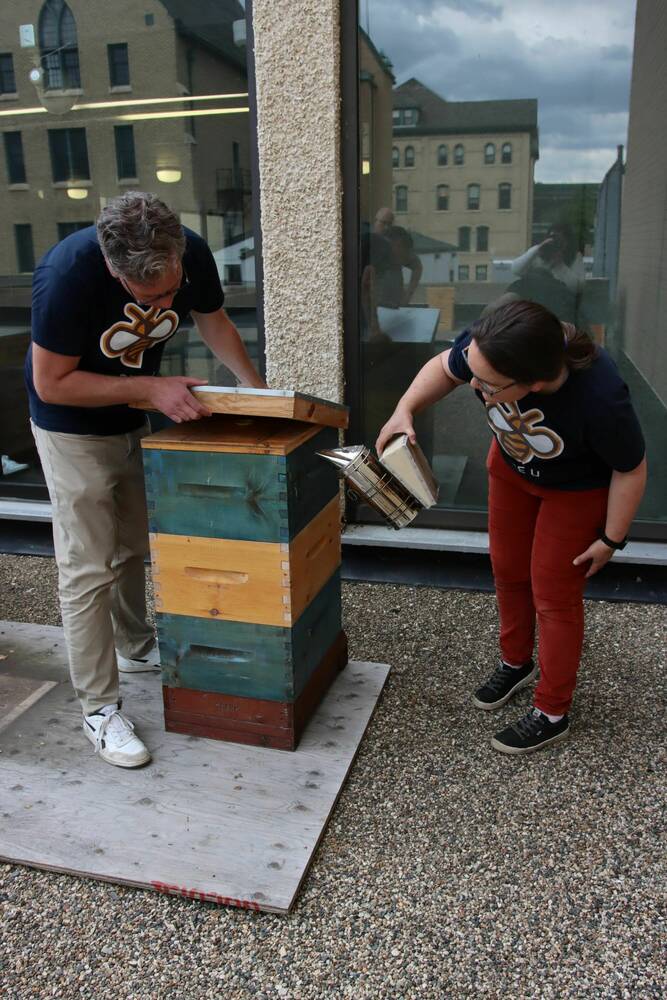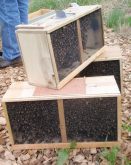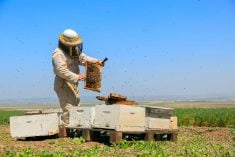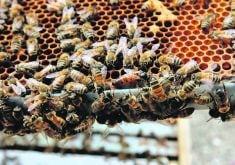Warmer weather in western Manitoba has turned a rooftop at Brandon University into a literal hive of activity.
It’s the third year for the university’s five-year “Bee U” urban beekeeping pilot, which has introduced the first urban honeybee populations in Manitoba’s second-largest city.
Grant Hamilton, the university’s director of marketing and communications, and Deanna Smid, project co-ordinator and assistant professor with BU’s English department, have partnered with Clark Apiaries owner Mike Clark on the pilot.
Read Also
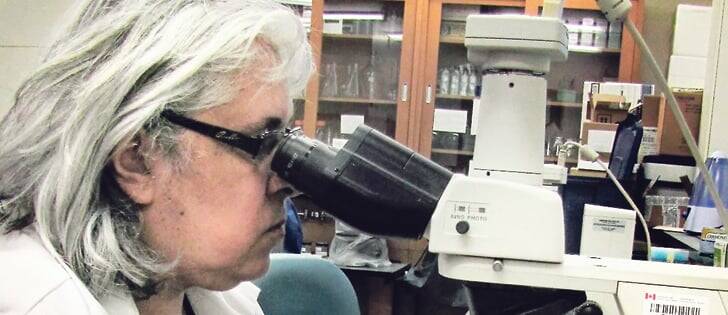
AAFC organic research program cut
Canada’s organic sector says the loss of a federal organic research program at Swift Current, Sask., will set the industry back.
Bees are on campus through the active season. After the honey harvest in late August or early September, they’re moved to Clark’s property near Wawanesa, southeast of Brandon, to overwinter.
Why it matters: Brandon University’s Bee U urban beekeeping project is meant as a model for sustainable agriculture and a way to educate urban residents about the honey sector and the role of pollinators.
The university embarked on the pilot in 2022, starting with two hives. Last year, two more hives were added. That translated into 225 kilograms of honey produced and later sold at the university’s bookstore.
The program boosts biodiversity and adds to the province’s bee population. It is also a tool for teaching people about the importance of pollinators by introducing them to honeybees, Hamilton said.
“Bees are photogenic. They’re lovable. They are calm. They’re really approachable and they produce honey.”
He hopes people will also get the message that bees and similar pollinators help keep flowers blooming and crops growing.
Three-quarters of the world’s crops need pollinators to flourish, according to a 2021 paper by Hannah Ritchie of Our World in Data, a scientific online publication that highlights global issues such as world hunger and climate change.
“It’s becoming a tougher world for pollinators,” Hamilton said. “We want to raise awareness of [their] plight.”
Challenges that make up that plight – which affect all pollinators – include habitat loss due to urbanization, loss of forests and grasslands, climate change and pesticide exposure, according to Bee Better Manitoba, an organization focused on pollinator conservation.
Parasitoid wasps can lay eggs in the nest cells of bees so that wasp larva feed on developing bees. Natural predators such as birds and bears also feed on pollinators, as do insects like crab spiders and ambush bugs.
Other threats include parasites and diseases such as chalkbrood, a fungal disease that can decimate bee populations through spore build up in nest materials.
Foulbrood is another serious threat. The spore-forming bacterial disease American foulbrood is particularly challenging for beekeepers. Infected materials are usually burned or otherwise destroyed. European foulbrood is another management headache, although bees are believed to weather it better.
But many of those issues pale against the curses commercial beekeepers have laid against varroa mites. The parasites are a major scourge for Canada’s honey sector, by weakening bees and as a vehicle for disease. Increasing varroa pressure is cited for high winter bee mortality in recent years.
Industry has also raised alarm over flagging control from products typically used to treat hives for mites, and research efforts are ongoing to find new control measures or products.
Honeybee problems often reflect challenges that face pollinators in the wild, Clark said.
“If our bees are having trouble surviving, then the natural pollinators are especially having troubles.”
Walking in farmer shoes
Hamilton hopes the Bee U program will become a blueprint for beekeeping in Brandon.
“We’re an agricultural community, but how many kids who grow up here in Brandon actually get out to the farm? So, here’s an opportunity where we can bring a little but of agriculture to you.”
Children from nearby daycares have already visited the hives via an atrium fitted with floor-to-ceiling windows facing the beekeeping setup. Students and university visitors often lounge on couches in the area to watch the bees and those who tend them.
Clark also hopes the project will provide an educational window into the beekeeping industry and its unique struggles.
“Agriculture is gigantic, [but] beekeeping is a small industry,” he said.
Manitoba has around 115,000 hives, most of them run by commercial beekeepers.
In the winter of 2021-22, 57 per cent of honeybee colonies were lost in the province, which was 27 per cent higher than the average expected loss of 30 per cent per year. Beekeepers had to buy replacement hives but there was a shortage of stock. The 2021 drought also negatively affected the industry.
Canadian beekeepers face stiff competition from imported honey that is adulterated with other sweeteners like rice or corn syrup, Clark said.
He and other members of the beekeeping industry, as well as several industry groups, are lobbying the federal government to crack down on the problem. In 2020, the Canadian Food Inspection Agency announced it was testing domestic and imported samples of honey for sale in Canada. Adding sugar to a product and selling it as honey is illegal under Canadian law.
At the time, 87 per cent of the honey samples were found to be authentic, but Clark said the fraudulent honey industry is growing every year.
“You’d think the government, or anyone with a brain, would see that when you’re producing 20 million pounds of honey in a year and the next year you’re producing 50 million pounds, it’s just impossible,” he said.
The university beekeeping project will be a highlight of the university’s Pollinator Week agenda June 17-23. Special events have been planned throughout the week.
“We want Bee U to keep growing, keep experimenting and keep learning, but we’re also really pleased with some of the successes that we’ve already had, and we love sharing those with people,” Smid said.


